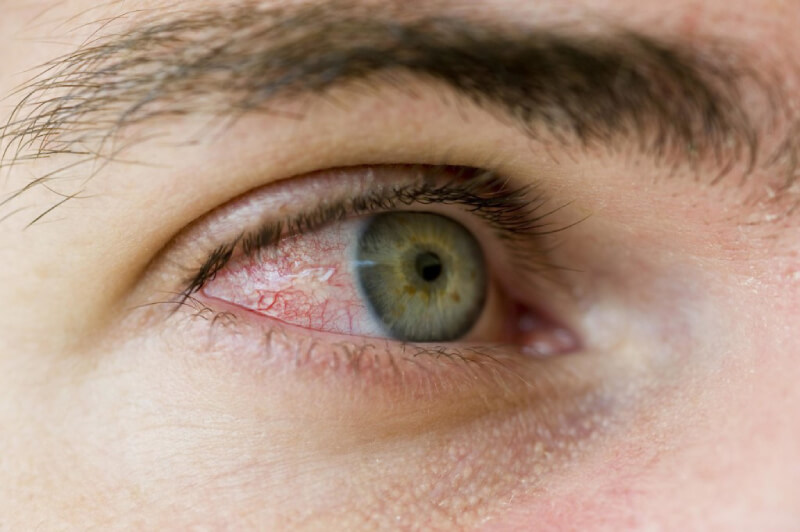- Swelling of the conjunctiva (the thin layer that lines the white part of the eye and the inside of the eyelid) and/or eyelids
- Increased tear production
- Feeling like a foreign body is in the eye(s) or an urge to rub the eye(s)
- Itching, irritation, and/or burning
- Discharge (pus or mucus)
- Crusting of eyelids or lashes, especially in the morning
- Contact lenses that do not stay in place on the eye and/or feel uncomfortable
One of the most concerning things about pink eye is that it is highly contagious. Or is it? Well, yes, if it is caused by a virus or bacteria, pink eye is extremely contagious and requires medical treatment. However, there is a non-infectious type of pink eye caused by allergies.
Allergic conjunctivitis can occur as a reaction to the same triggers that cause seasonal allergies (pollen, mold, pet dander, dust). WebMD explains that the layer of skin that covers your eyes and the inside of your lids is the same as the skin that lines the inside of your nose. It makes sense, then, that both areas can be irritated by the same substances. It also makes sense that this type of pink eye usually appears in both eyes.
Fortunately, allergic conjunctivitis will usually go away on its own, but why suffer if you don’t have to. When you make an appointment at CT Sinus Center, our expert physicians can help you keep from seeing red when allergies hit. When you come in, we will discuss your symptoms at length in order to find clues as to what is triggering your condition. Next, we will perform thorough testing to identify the actual cause of your allergies and develop an individualized treatment plan to get you back to seeing clearly in no time.
As we discussed in our blog “Should You Drop Your Allergy Eye Medications?” there are several ways to treat eye allergies with medications such as antihistamines, nonsteroidal anti-inflammatories, corticosteroid anti-inflammatories, decongestants, and mast cell stabilizers. Immunotherapy (shots or SLIT) is another effective way of treating allergic conjunctivitis.
Also, because eye allergies are usually a sign of seasonal allergies and are accompanied by the same symptoms (congestion, runny nose, cough, sinus pressure), you may be eligible for one of our two outpatient procedures that can put a permanent end to sinus suffering altogether:
- Balloon Sinus Dilation, which will reshape your nasal passages, promoting draining and natural healing
- Turbinate Reductions, in which the tissue in the nose that supports the nasal passages is decreased, decreasing the size of the turbinate and quickly increasing airflow
Isn’t it time you found relief? Call (860) BALLOON to make an appointment at one of our four conveniently-located offices today. We promise you that our allergy team will be a sight for sore eyes.
For more information on all things sinus– and allergy-related, visit the CT Sinus Center website and blog.



